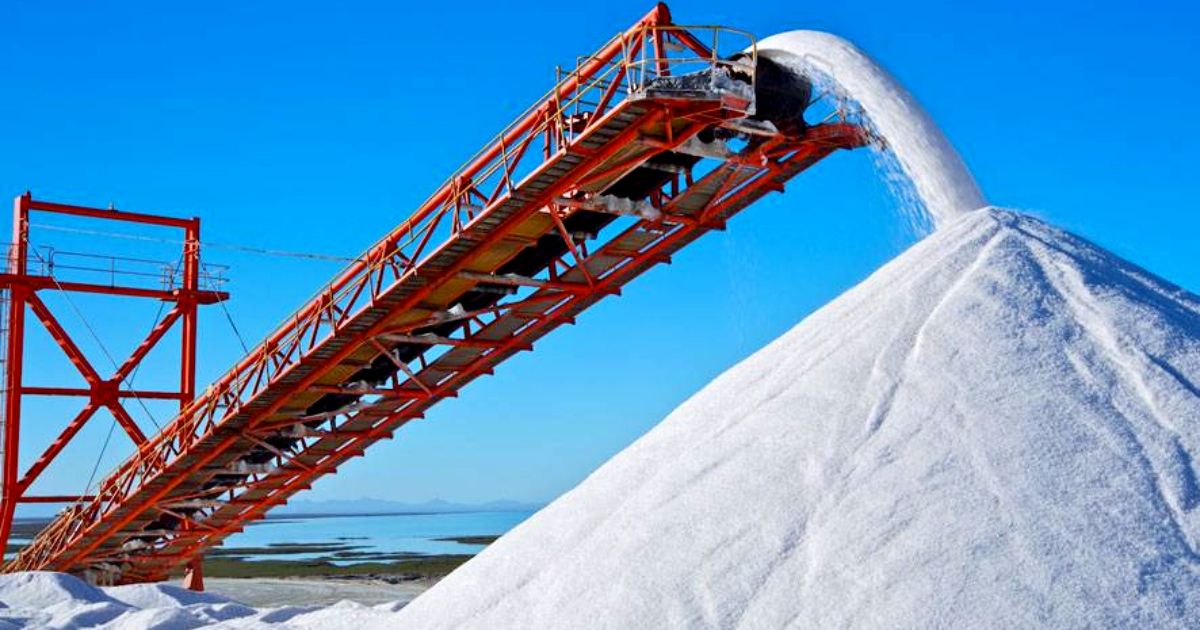The ongoing decline in food distribution in Cuba highlights the severe shortcomings of the rationing system. In August, Havana residents began receiving their salt quotas for June and July, a significant delay that underscores the island's logistical and distribution crisis. This delay in delivering essential goods is not an isolated incident but part of a broader issue affecting the entire nation.
The Ministry of Domestic Trade of Cuba (MINCIN) announced on social media the distribution of the regulated family basket for August, emphasizing that rice, sugar, and beans continue to be distributed, albeit with notable delays. However, the most striking issue is the late delivery of salt, a crucial product that has been scarce in state-run stores for several months.
The Salt Shortage and Logistic Crisis
The salt problem in Cuba is not new, but it reached a critical point in 2024. According to Fabio José Raimundo Paz, director-general of the Geominero Salinero Business Group (Geominsal), although "tens of thousands of tons of salt are ready for distribution," the lack of transportation has prevented this product from reaching the population. This situation has been exacerbated by adverse weather conditions affecting production in regions like Matanzas, where salt production facilities have been repeatedly destroyed by cyclones over the past 30 years.
Raimundo Paz stated on the official Mesa Redonda program that logistical difficulties and limited resources have been the main obstacles to salt distribution in the country. Despite the Cuban government's repeated blame on the transportation crisis for the shortage, the reality is that inefficiency in distributing essential goods like salt reflects deeper issues within the Cuban economy.
Impact on Daily Life and Public Complaints
The salt shortage and other basic goods have had a devastating impact on the daily lives of Cubans. With no salt available in state-run stores, many Cubans are forced to buy this product at exorbitant prices from Micro, Small, and Medium Enterprises (Mipymes). A recent example is Inés Casal, a Havana resident who had to pay 530 pesos for just over a pound of imported Goya brand salt from a private business.
Complaints about the lack of salt have flooded social media, where Cubans express their frustration and desperation over not being able to purchase such a basic product. "No more salt! An island surrounded by the sea. I don't remember the last time it was sold through the 'basic basket,'" lamented Casal in her Facebook post. Such testimonies reflect the growing discontent among the population, who find it increasingly challenging to access essential products through the state-run rationing system.
Government Response and Protests
The Cuban government has tried to justify the situation by citing logistical and financial problems. Betsy Díaz Velázquez, Minister of Domestic Trade, acknowledged in a report presented to the National Assembly of People's Power (ANPP) that financial difficulties have prevented achieving necessary coverage and timely product reception. Despite these justifications, the population has begun to express their discontent more actively.
In Palma Soriano, Santiago de Cuba, a group of residents gathered outside a state store to demand the delivery of rationed foods that had not yet been received, months after they were due. "No more abuse, no more lies, no more misery, we are hungry," was the cry of the protesters.
An Uncertain Future
The situation in Cuba remains uncertain, with a government seemingly incapable of resolving the structural issues affecting food distribution on the island. Meanwhile, Cubans continue to face a reality marked by scarcity, high prices, and uncertainty about whether they will be able to access the most basic goods in the near future. The insistence that "each municipality has to fend for itself," as stated by President Miguel Díaz-Canel, does not seem to offer a real solution to the growing difficulties faced by the population.
Understanding the Cuban Salt Crisis
Here are some frequently asked questions about the salt shortage and logistics crisis in Cuba to help you understand the situation better.
Why is there a salt shortage in Cuba?
The salt shortage in Cuba is due to logistical difficulties and adverse weather conditions that have affected production, particularly in regions like Matanzas. Additionally, transportation issues have compounded the problem, preventing the distribution of available salt stocks.
How is the Cuban government addressing the salt shortage?
The Cuban government has cited logistical and financial challenges as reasons for the salt shortage. However, efforts to improve distribution have been hampered by these ongoing issues, leading to significant delays and public dissatisfaction.
What impact does the salt shortage have on daily life in Cuba?
The salt shortage has severely impacted daily life in Cuba, forcing many to purchase salt at high prices from private businesses. This situation adds to the financial burden on citizens who already struggle with other shortages and economic challenges.
